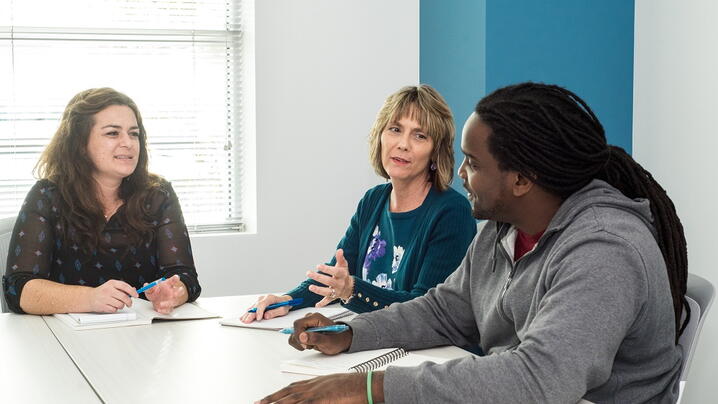
by Amanda Relyea, director of professional development, ICMA
What kinds of leadership and management skills do you, as a local government professional, need? Some answers are easy to articulate, even if they are not always easy to carry out. You must be able to communicate the community’s vision and values; effectively coach and empower staff or lead from your seat if you are not a supervisor; and cultivate accountability, innovation, and excellence.
Other answers are not as easy because today's world is changing rapidly, which affects the role of the local government professional. A few years ago, the ICMA Task Force on Leadership began to outline the necessary skills by first identifying the forces and challenges that will affect local government in the next 10 to 25 years, and second, by identifying the leadership skills that everyone in the organization must possess to meet those challenges.
The Leadership Advisory Board (LAB) has continued that work by updating the ICMA Practices for Effective Local Government Leadership and the ICMA University catalog and career stage guide, completing a gap analysis, and developing new programs. Veronica Ferguson, retired county administrator of Sonoma County, California, and member of LAB, says, “I think of leadership training as a journey and ICMA as a travel partner and tour guide to organizational success. LAB is working to define the needs, and ICMA is working to offer the relevant courses in flexible and varied designs to best suit an individual or organization’s needs.”
Forces and challenges that the task force identified include technological development and innovation, climate change and other environmental concerns, economic sustainability, social equity, varied and increasing public expectations, fragmentation of community, and political polarization. In addition to these, local government professionals will continue to deal with such emergencies as terrorism, health epidemics and pandemics, and weather events.
To prepare for and respond to these forces and challenges, local government professionals will need “exceptional team-building and interpersonal skills” like facilitation, negotiation, and “leading without being in control of all the moving pieces”; versatility and comfort with change; political astuteness without political alignment; partnership-building and other collaboration; intelligent risk-taking; and other soft skills. This is in addition to mastery of the hard skills like financial management, technological literacy, emergency preparation and management, and knowledge of other functional areas.
So how do you learn and improve these skills? And how do you take charge of your own professional development regardless of where you are on the organization chart?
1. Don't be afraid to ask.
If you need time away from the office or funding to participate in leadership or professional development or training programs, prepare your case. Be specific about what you want to learn and how it will help your organization and community. If you can clearly outline the benefit to your employer, your chances of approval are higher. Go in with a positive attitude and a few backup options in case your organization just doesn’t have the budget that's needed. Ask whether it’s possible for next year or have a few no- to low-cost options that you can request as an alternative.
2. Consider all your options.
When we’re thinking about professional development, we tend to think of conferences, workshops, and seminars first, but many other options are available too, including leadership development programs, book study, articles, online training, virtual conferences, discussion groups, and more. These are offered by a variety of different organizations, including national and state professional associations and universities, among others. They range from complimentary to low cost to high cost, depending on sponsorship availability, promotion or marketing orientation versus skill-building orientation, length, and other factors. ICMA alone, for example, offers seven leadership development programs for individuals ranging from emerging leaders to experienced executives. This is in addition to conferences, workshops, online certificate programs, webinars, and articles.
3. Find a coach or mentor.
Having a sounding board and adviser can be incredibly helpful as you navigate your career, whether you are just starting out, very experienced in your field, or somewhere in between. Perhaps you’ve connected with someone you respect in the profession, but if you haven’t, reach out to ICMA or your state or affiliate association for help finding a mentor or coach. Many ICMA members have volunteered to be mentors or coaches through the ICMA Coaching Program and ICMA Emerging Leaders Development Program. If you’re further along in your career, you can often find peers who are willing to serve as sounding boards at small cohort opportunities like the ICMA Senior Executive, Williamsburg, or Gettysburg Leadership Institutes.
4. Pave the way for others.
Whether you’re the local government manager, or a first-line supervisor, or just hope to be some day, remember to offer leadership and professional development opportunities to your staff and encourage your top leadership to do the same. Not everyone will ask. They may assume they know what the answer is, or they may think they don’t have enough time invested yet.
As Kate Fitzpatrick, town manager of Needham, Massachusetts, and chair of the ICMA Leadership Advisory Board notes, “The most effective leaders create an environment in which staff are encouraged to learn new skills and try new ideas. With the right mix of culture and training, all staff in the organization will be leaders. Local government professionals who dedicate the time and attention needed for the personal and professional development of themselves and their colleagues will oversee the most vibrant and successful communities.”
New, Reduced Membership Dues
A new, reduced dues rate is available for CAOs/ACAOs, along with additional discounts for those in smaller communities, has been implemented. Learn more and be sure to join or renew today!
